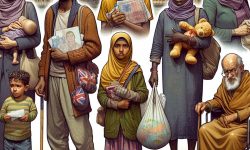
Immigration and Freedom of Speech: The Legal Grey Area
Recently, the ongoing debate around immigration policy in the United States received a fresh note of discord when Ann Coulter, a well-known right-wing commentator, publicly questioned the Trump administration’s efforts to deport Mahmoud Khalil, a Palestinian graduate student at Columbia University. This unexpected turn of events adds a complex layer to discussions surrounding immigration and freedom of speech rights.
Khalil, who is a permanent resident, was arrested amid escalating tensions surrounding his participation in protests against the Israeli government on campus. Coulter’s statement sparked discussions about the implications of such deportations on First Amendment rights, particularly focusing on whether non-citizens like Khalil should enjoy similar protections.
The First Amendment: Who Does It Protect?
The First Amendment of the U.S. Constitution guarantees freedom of speech, but there remains a significant debate about who falls under its protection. Legal experts have noted that while the First Amendment primarily shields U.S. citizens, permanent residents also possess certain rights that could be invoked in such scenarios.
Coulter’s comments highlight a crucial point: “There’s almost no one I don’t want to deport. But, unless they’ve committed a crime, isn’t this a violation of the First Amendment?” This statement expresses a dichotomy within immigration enforcement that challenges the current legal landscape.
Activism and the Trump Administration’s Policies
Mahmoud Khalil’s arrest was a direct consequence of enforcement measures initiated by the Trump administration, including executive orders designed to crack down on antisemitism and its association with pro-Palestinian sentiments. The Department of Homeland Security confirmed Khalil’s detention but notably did not charge him with any crime related to his activism.
This raises the question of where the line is drawn between legal activism and actual criminal conduct. Many advocates fear that the administration’s sweeping measures could suppress activism across other university campuses, inducing a chilling effect on student engagement in political discourse.
A Broader Perspective: Protests, Immigration, and Public Sentiment
Khalil’s case has not only shocked immigrant advocates but has also stirred a public outcry that battles ideological divides. Supporters argue that Khalil’s actions are rooted in legitimate concerns and advocacy against the Israeli government’s policies, distinct from antisemitism.
Trump’s response to expand scrutiny of pro-Palestinian activists reflects a larger trend of utilizing immigration authorities to target ideological opponents. As he stated on social media, “We will find, apprehend, and deport these terrorist sympathizers from our country.” Statements like these not only heighten tensions but also politicize immigration enforcement in ways that could redefine future protests.
Legal Battles: Khalil’s Defense and Immigrant Rights
As lawyers representing Khalil work on his case, they emphasize that deportation without a crime conviction sets a dangerous precedent. Khalil’s pregnant wife, a U.S. citizen, has also added a personal dimension to the narrative, illustrating the profound effects of immigration policy on families.
Federal law permits the deportation of permanent residents under certain conditions, but the broad application of immigration enforcement raises concerns about due process rights and judicial oversight. Legal precedents indicate that a court should assess the legitimacy of the deportation based on the individual’s actions and intent.
A Future of Uncertain Legal Precedents
The Mahmoud Khalil case may well serve as a litmus test for discerning how contemporary political climates influence enforcement of immigration laws against free speech rights. As the legal complexities surrounding Khalil’s situation evolve, so too does public discourse concerning the intersection of activism, immigration, and constitutional protections.
This legal tussle holds potential implications far beyond Khalil himself; it could shape future policies targeting immigrant activists. In a climate where government action against protests is becoming increasingly commonplace, maintaining a balance between national security and upholding fundamental rights is more crucial than ever.
To learn about the disclaimer of liability for the content of this website, click here



